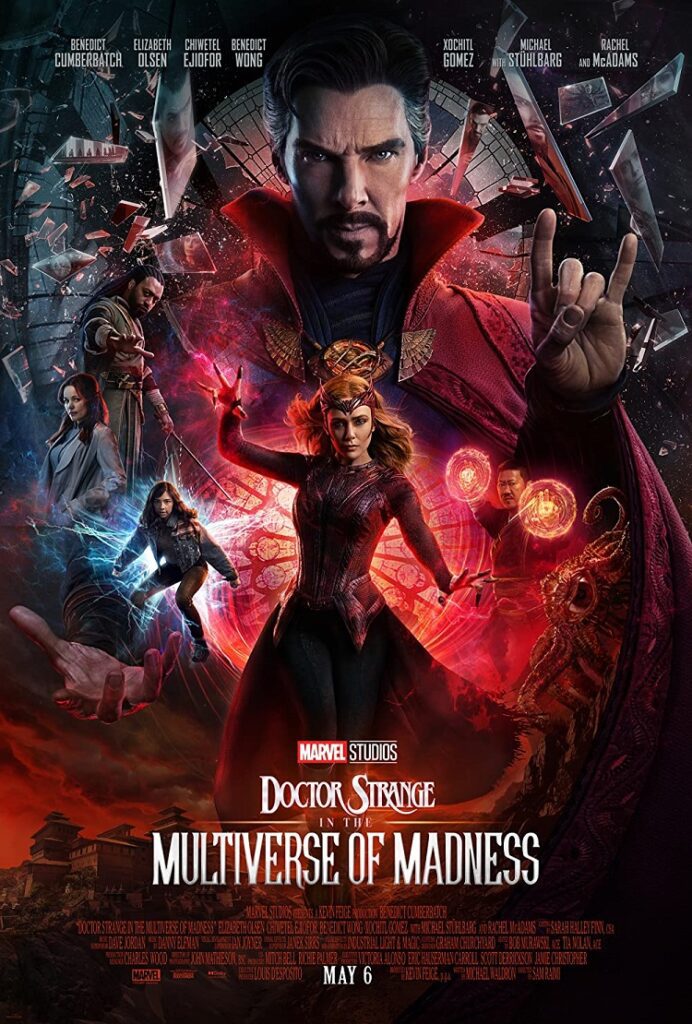
After Doctor Strange director and co-writer Scott Derrickson stepped away due to creative differences, director Sam Raimi was given the reins to a Doctor Strange movie tasked with a lot to do. It has to be a standalone adventure while wrapping up the WandaVision Disney+ TV series. It has to introduce new characters and re-introduce old ones. All this while crisscrossing the Multiverse.
That last part may not be as hard as it sounds. Marvel Cinematic Universe fans have had recent excursions in Loki and Spider-Man: No Way Home, the latter briefly referred to in a scene that feels like it was an afterthought. The concept seems to be all the rage lately as it has appeared in Sony’s MCU-adjacent Spider-Man: Into the Spider-Verse, the Distinguished Competition’s Arrowverse (multiple times)and upcoming The Flash movie, and in the non comic book movie, Everything Everywhere All at Once.
The Madness starts off in the Multiverse as a Spanish-speaking, pony-tailed Dr. Strange (Benedict Cumberbatch) helps America Chavez (Xochitl Gomez), stay out of the clutches of a fire demon while trying to obtain a magic book in a pocket dimension. This Strange realizes the only way to defeat the creature is to take America’s powers, which will kill her, but he determines it is for the best.
Prime Strange (of Earth-616) wakes up from that nightmare to attend another nightmare: the wedding of former girlfriend Christine Palmer (Rachel McAdams). After the ceremony, they share a moment where he professes his regret their relationship didn’t work out. Before the festivities are over, Strange is called to action when a monster (“eyeball octopus” probably isn’t correct but that’s what it looks like) is chasing America through the streets. Assisted by Sorcerer Supreme Wong (Benedict Wong), they defeat the monster, in an amusingly gruesome way that should especially appeal to Raimi fans.
The magicians learn that America has the ability to jump through the Multiverse but not the skill to control it. The monsters are being sent by a villain who wants her power. Wong takes America to Kamar-Taj to protect her while Strange seeks the help of Wanda (Elizabeth Olsen), which is a dire mistake as she is the villain in question.
During WandaVision, her grief over the loss of Vision led her to take over a town and force the citizens to live out her wishes. While there, she created a pair of children, who disappeared when her spell over the town did. She believes they are out in the Multiverse and wants to be reunited with them, using the Darkhold, an evil magical book. (Right up Raimi’s alley.)
America and Strange universe-hop until they reach Earth-838 in the hopes of finding help from its Doctor Strange, but he died fighting Thanos. However our heroes soon learn that the 838 heroes known as the Illuminati (a roster of new and familiar faces) are worried about the damage their incursion might cause, especially Strange if he’s anything like his counterpart considering he almost destroyed their universe with the Darkhold. Another jump by Strange reveals a universe where just such a thing occurred.
There’s a lot of death and destruction in the battles: Wanda fights against the sorcerers of Kamar-Taj, and against the Illuminati, although Wanda defeats one superhero so easily, it’s incomprehensible why she doesn’t repeat the tactic. But credit to the imaginative musical battle between two Stranges that is so inventive it should affect the way magic is handled in future MCU movies.
Michael Waldron’s script offers a lot of fun moments for the characters, especially Strange, whose 616 iteration shows some growth. In a good twist, Wanda gains access to what she desires, allowing her to learn the repercussions. Inexplicably though, Wanda is solely focused on the loss of her children, but not of Vision, which makes no sense. It can’t be that Wanda learned to resolve her feelings for Vision or she wouldn’t be making a similar mistake. It’s almost as if the MCU powers that be didn’t want the movie too tied to the TV series yet essentially it is the sequel so they might as well embrace it.
The Multiverse of Madness sees the MCU expand into horror and Raimi proves to be the right man to have been at the helm. There might be too much going on for the casual viewer, but those invested in the MCU should enjoy it. The movie brings needed closure to Wanda’s story, further expands the universe, and offers lessons in dealing with grief and in dealing with street vendors. There is a mid-credits and a post-credits scene. Both are cameos that don’t appear to tie into Thor: Love and Thunder.